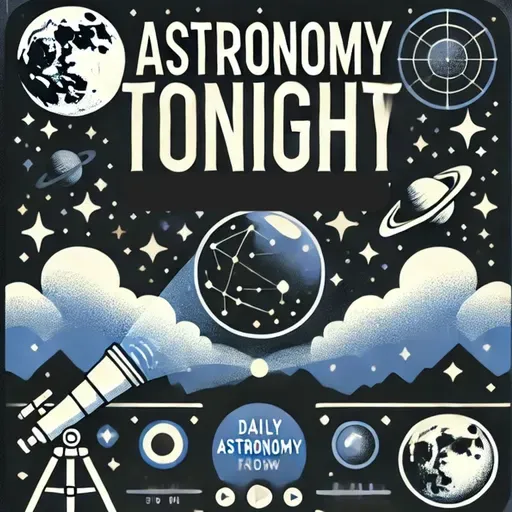
About
This is your Astronomy Tonight podcast.
On September 10th, 1846, astronomers were on the verge of one of the most exciting discoveries in the history of planetary science. The German astronomer Johann Gottfried Galle, using calculations provided by the French mathematician Urbain Le Verrier, was about to make the first observation of the planet Neptune.
Picture this: It's a crisp autumn evening at the Berlin Observatory. Galle, armed with Le Verrier's predictions and a powerful telescope, scans the night sky. His heart races as he realizes he's about to potentially confirm the existence of a new planet, one that had been theorized but never seen.
The next night, on September 11th, Galle's diligence paid off. He spotted a faint blue-green dot, less than one degree from where Le Verrier had predicted it would be. This wasn't just any celestial body – it was a whole new world, the first planet discovered through mathematical predictions rather than serendipitous observation.
The discovery of Neptune was a triumph of scientific collaboration and mathematical prowess. It showed that the universe could be understood through the power of human reason and calculation. Imagine the excitement and awe Galle must have felt as he realized he was the first person in history to lay eyes on this distant, icy giant.
Neptune, with its deep blue color and turbulent atmosphere, has fascinated astronomers ever since. It's a world of supersonic winds and massive dark spots, a planet that takes 165 Earth years to complete one orbit around the Sun. Its discovery opened up new frontiers in our understanding of the solar system and the power of mathematical astronomy.
So, the next time you gaze up at the night sky, remember Johann Gottfried Galle and the night he changed our view of the solar system forever. Who knows what other celestial wonders are out there, waiting to be discovered?
Don't forget to subscribe to the Astronomy Tonight podcast for more fascinating stories from the cosmos. If you want more info, check out QuietPlease.AI. Thank you for listening to another Quiet Please Production.
On September 10th, 1846, astronomers were on the verge of one of the most exciting discoveries in the history of planetary science. The German astronomer Johann Gottfried Galle, using calculations provided by the French mathematician Urbain Le Verrier, was about to make the first observation of the planet Neptune.
Picture this: It's a crisp autumn evening at the Berlin Observatory. Galle, armed with Le Verrier's predictions and a powerful telescope, scans the night sky. His heart races as he realizes he's about to potentially confirm the existence of a new planet, one that had been theorized but never seen.
The next night, on September 11th, Galle's diligence paid off. He spotted a faint blue-green dot, less than one degree from where Le Verrier had predicted it would be. This wasn't just any celestial body – it was a whole new world, the first planet discovered through mathematical predictions rather than serendipitous observation.
The discovery of Neptune was a triumph of scientific collaboration and mathematical prowess. It showed that the universe could be understood through the power of human reason and calculation. Imagine the excitement and awe Galle must have felt as he realized he was the first person in history to lay eyes on this distant, icy giant.
Neptune, with its deep blue color and turbulent atmosphere, has fascinated astronomers ever since. It's a world of supersonic winds and massive dark spots, a planet that takes 165 Earth years to complete one orbit around the Sun. Its discovery opened up new frontiers in our understanding of the solar system and the power of mathematical astronomy.
So, the next time you gaze up at the night sky, remember Johann Gottfried Galle and the night he changed our view of the solar system forever. Who knows what other celestial wonders are out there, waiting to be discovered?
Don't forget to subscribe to the Astronomy Tonight podcast for more fascinating stories from the cosmos. If you want more info, check out QuietPlease.AI. Thank you for listening to another Quiet Please Production.